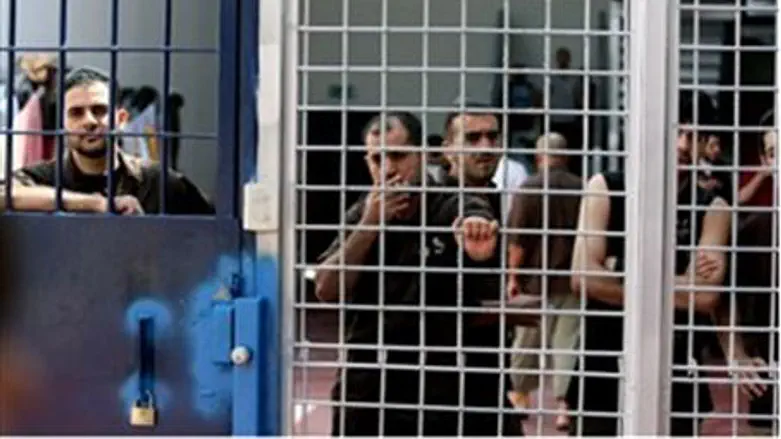
Israel's prisons are too crowded – so, in order to ensure compliance with newly-instituted rules on the amount of space prisoners are entitled to, the Prisons Service on Thursday released some 800 prisoners, who had been convicted of various crimes, from misdemeanors to felonies.
Among the 800 who were released were 200 security prisoners, mostly Arabs who had been arrested, tried, and found guilty of terrorist activity – and among that group released Thursday was Sheik Hassan Yousef, a Hamas founder and one of its top operatives in Judea and Samaria, who helped plan many of the terrorist group's attacks in the region. Yousef is the father of Mosab Hassan Yousef, who was revealed in 2010 to be a Shin Bet operative working undercover in Gaza. He is credited with helping to prevent dozens of terror attacks, thanks to the information he supplied Israelis security with.
The elder Yousef was serving a six year sentence for conspiracy in several bombing attacks. He had been set to be released in about two months.
According to a new regulation enacted several days ago by the Prisons Service after much pressure from the Knesset Interior and Environment Committee, the maximum number of prisoners in Israeli penal institutions cannot exceed 17,700. According to the regulation, each prisoner must be given at least 3 square meters of living area, and dividing that area with the amount of space in all of the country's prisons yields a figure of 17,700. After Thursday's release, the prisoner population is now “in balance;” however, when new prisoners are added, veteran prisoners will have to be released to make room for them. Prisons Service officials, by contrast, said there was enough room for all prisoners.
It should be noted that the space limitation applies only to prisoners serving proper sentences in regular prisons; it does not apply to people being held in detention centers after they were first arrested (usually for 24 or 48 hours) or to prisoners whose remand has been extended and are awaiting trial. It also does not extend to illegal aliens, who are held in separate facilities. A prisoner census update will be taken once every few weeks, and when the prisoner population exceeds 17,700, a group of prisoners – hopefully close to the end of their sentences – will be released.
However, Israel's prisons may have to “shed” many more inmates soon; MK Amnon Cohen (Shas), who heads the Interior and Environment Committee, is preparing to propose a law that will more than double the amount of space that must be provided to prisoners – from 3.1 square meters to 6.5 square meters. “Lack of a code on prison overcrowding, and failure to improve the conditions under which prisoners are held, is unacceptable in a country that purports to defend the rights and dignity of the individual.” Under his new law, Cohen said, the Prisons Service “will have to free prisoners if it cannot provide them with the minimal conditions of support, as is the practice in enlightened Western countries.”